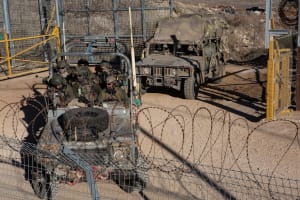Iran’s energy crisis, partially caused by Israel, has led to shutdowns in industry and government offices
Government corruption, economic mismanagement align with covert strikes triggers energy emergency

The Iranian government announced widespread closures of schools, universities, and government offices last week as Tehran grapples with a deepening energy crisis amid harsh winter weather.
Reports from Iran noted that more than 20 provinces were forced to close educational facilities and government offices due to electricity shortages. On Dec. 12, unexpected power outages struck the capital city of Tehran, disrupting businesses and transportation, and left many without the power needed to heat their homes.
The Iranian government has implemented fuel rationing for certain non-essential businesses, while President Masoud Pezeshkian called on citizens to lower the temperature in their homes to help bear the burden. Neither has been favorably received by the public.
With government officials reporting daily gas deficits of 350 million cubic meters of natural gas and other fuels, more than a dozen power plants have been taken offline, contributing to electricity blackouts.
The winter woes follow a summer of nationwide blackouts in which soaring electricity demand far outstripped the already struggling energy sector’s ability to cope.
Many are questioning how Iran, which is rich in natural gas reserves and oil reserves, is experiencing such problems. While years of underinvestment in upgrading the energy infrastructure, along with years of U.S.-led sanctions, have certainly had a significant impact on the current energy crisis in Iran, there appears to be another more recent contributing factor – targeted attacks by Israel on Iran’s natural gas infrastructure.
In November, Pezeshkian said the country was facing "very dire imbalances in gas, electricity, energy, water, money and environment.”
“All of them are at a level that could turn into a crisis,” the Iranian leader said in a televised address to the nation.
According to a report in The New York Times in February, Israel launched covert attacks on two major natural gas pipelines in Iran, which caused significant disruption to the country’s energy production.
At the time, Javad Owji, Iran’s oil minister blamed the attack on an enemy of the state, without specifically naming Israel.
“The enemy’s plan was to completely disrupt the flow of gas in winter to several main cities and provinces in our country,” he stated.
The New York Times alleges that the Iranian government drew on strategic gas and oil reserves to cover the shortfall, but did not adequately work to replenish reserves or update infrastructure to account for the loss.
The damage, combined with the Iranian government's recent shift toward using natural gas for electricity generation and expanding gas lines for home heating and cooking, has made the fuel crisis particularly severe.
Still reeling from military blows inflicted by Israel on its proxies Hezbollah and Hamas, the Islamic regime is now dealing with an energy crisis from targeted Israeli strikes meant to exacerbate public discontent with the government.
Iranian opposition media groups reported demonstrations in several Iranian cities that began on Dec, 16 and continued for several days, protesting the energy cuts and blackouts.
Protests in Isfahan, Mehrshahr Karaj and Tehran called for the collapse of the Iranian regime, with some protesters holding signs that read: “Death to the dictator, death to Khamenei.”
Calling for continued protests, one demonstrator in Tehran chanted, “Every night we will gather until this regime falls!”
With winter tightening its grip, the government’s failure to provide heating and electricity threatens to increase public discontent for the regime, which is already beset with rising resentment over what the public says are misplaced priorities.

The All Israel News Staff is a team of journalists in Israel.
You might also like to read this:
















